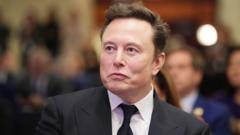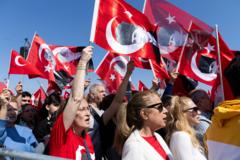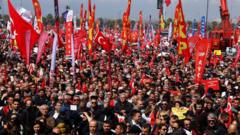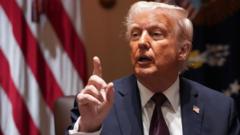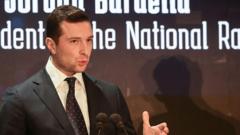Friedrich Merz, now poised for a potential leadership role in Germany, is generating buzz with his unconventional tactics. Long seen as a member of the CDU’s establishment, Merz has taken risks, notably his recent efforts to tighten immigration rules, drawing votes from the far-right Alternative für Deutschland (AfD), which may alienate moderate supporters.
Friedrich Merz: The Conservative Gambit in Germany’s Political Landscape
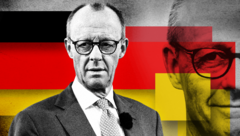
Friedrich Merz: The Conservative Gambit in Germany’s Political Landscape
Merz, the conservative frontrunner, is reshaping Germany’s politics with a bold approach.
Merz's journey from being sidelined by Angela Merkel to now leading the CDU showcases his ambition and adaptability. With the elections near, his strategies pose questions about the future of coalition politics in Germany and how he will engage with the electorate's varying sentiments.
His supporters believe Merz could be the antidote to Europe’s political malaise, yet the implications of his tactics remain a point of contention among voters.
In a pivotal moment for Germany, Friedrich Merz is no stranger to political upheaval and risk-taking. In anticipation of the upcoming federal elections, he draws attention by positioning himself as the possible leader who could bring a decisive shift to the conservative narrative in the country. After years away from politics, working in corporate roles, Merz's return has reignited interest and debate surrounding his ambitions and approach to policy, particularly regarding immigration.
His recent move to back stricter migration laws, leveraging support from the AfD, marks an unmistakable deviation from CDU's centrist legacy under Merkel, igniting controversy and mass protests. While detractors argue this strategy only boosts the far-right, supporters contend it cleverly courts disenchanted voters.
This polarizing method reveals the challenge ahead: winning over a diverse electorate while managing the delicate balance within potential coalition partners. As the election date looms, the pressure and scrutiny facing Merz will test his resolve and political savvy, redefining the landscape of German conservatism for years to come.
Critics and supporters alike will observe how Merz navigates the entangled web of relations with other parties and the public's perceptions, pondering whether his confrontational style can forge a new path for Germany's political future. Whatever the outcome, his presence signifies a noteworthy inflection point amid a shifting European political climate.
His supporters believe Merz could be the antidote to Europe’s political malaise, yet the implications of his tactics remain a point of contention among voters.
In a pivotal moment for Germany, Friedrich Merz is no stranger to political upheaval and risk-taking. In anticipation of the upcoming federal elections, he draws attention by positioning himself as the possible leader who could bring a decisive shift to the conservative narrative in the country. After years away from politics, working in corporate roles, Merz's return has reignited interest and debate surrounding his ambitions and approach to policy, particularly regarding immigration.
His recent move to back stricter migration laws, leveraging support from the AfD, marks an unmistakable deviation from CDU's centrist legacy under Merkel, igniting controversy and mass protests. While detractors argue this strategy only boosts the far-right, supporters contend it cleverly courts disenchanted voters.
This polarizing method reveals the challenge ahead: winning over a diverse electorate while managing the delicate balance within potential coalition partners. As the election date looms, the pressure and scrutiny facing Merz will test his resolve and political savvy, redefining the landscape of German conservatism for years to come.
Critics and supporters alike will observe how Merz navigates the entangled web of relations with other parties and the public's perceptions, pondering whether his confrontational style can forge a new path for Germany's political future. Whatever the outcome, his presence signifies a noteworthy inflection point amid a shifting European political climate.








